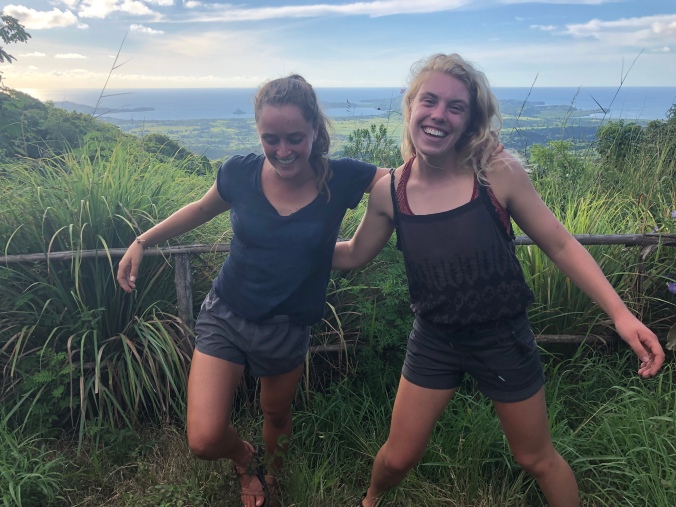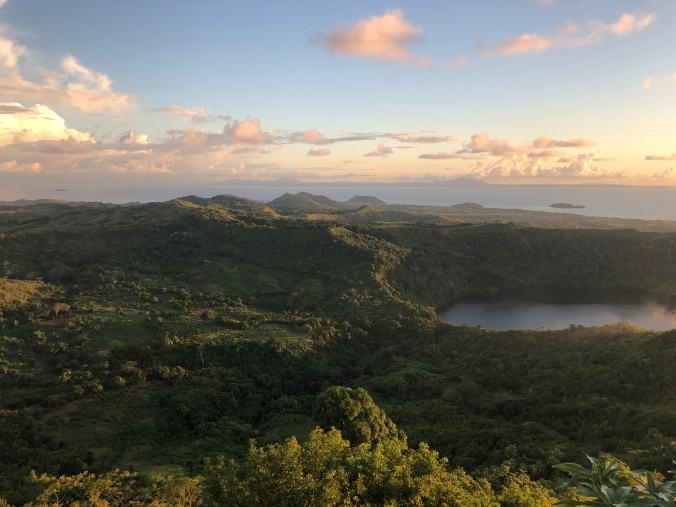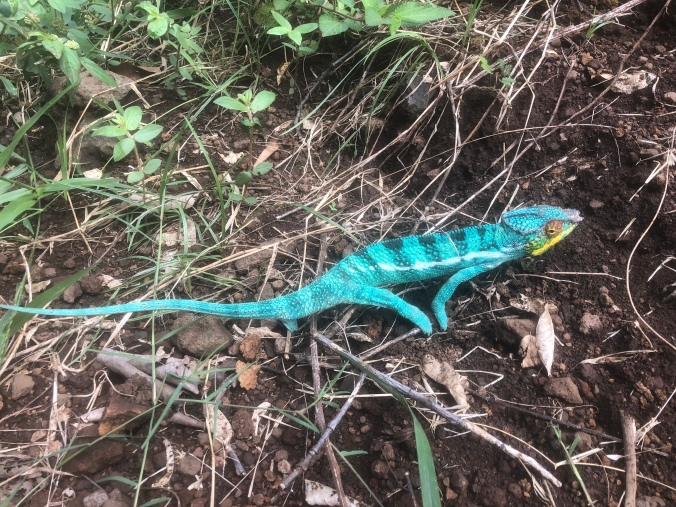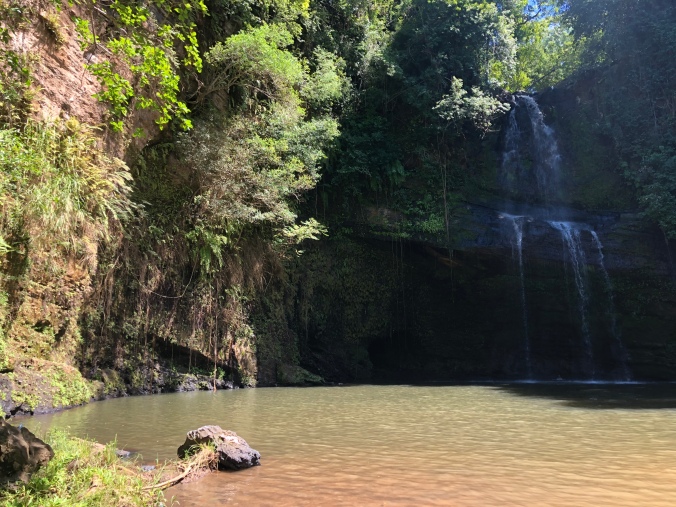tsiku= air, tsitsiku= wind, tsiku tsiku= gossip
April 5, 2019
I went back to CNRO in the morning and interviewed another of the young female researchers.
In the afternoon, I interviewed the director of Tanihely National Park in her office. The day was no hotter than any other, but the second I sat in the concrete room, so ocean breeze, my body started to run all over with sweat. We talked for forty five minutes and she had so much to say for every question I asked.

April 6, 2019
I have no memory of what we did this day. Probably went to the beach and/or drank coffee at the hostel. It was a weekend, so maybe Gisèle cooked but maybe we did. It’s all a haze.
Instead, this: every now and again, I am swept over with a feeling of wonder. I live in Madagascar. Another country. Almost halfway around the world. I am in another hemisphere, though flying here made it feel that I could be anywhere, could have just had a really delayed flight that spit me out somewhere near Chicago. I live in Madagascar. I am learning the language, I can walk barefoot in the streets, I buy food from women sitting on the side of the road and cut it open while I walk. I live in Madagascar and I probably never will again. I live in Madagascar and my home sits placidly, frozen under snow many time zones away and some day soon I will return there, but for now, zah mipetraka Madagasikara.
April 7, 2019
All four of us went to the beach in the morning. When we got home, Gisèle had covered the table in a beautiful meal with so many dishes. She must have cooked all morning starting before five am. We are so spoiled.
We were too full to eat much dinner that night, so we are grapefruits from the market. We keep turning to get into more of a cooking rhythm, but not everyone takes initiative for cooking, leading to classic roommate resentment, and food spoils quickly and sometimes unexpectedly in ninety degree heat. The rice weighs us down. We like eating fruit and snacks for dinner, like the casualness that comes with scrounging together a meal in the evening, like the freshness of it, like the way it takes us out of the structure that has become our normal here and reminds of being college students at home.


April 8, 2019
Everything is done for you here. Children and vazahas both are expected to just rely on parents, guardians, or guides. Everyone was surprised we would want to cook for ourselves rather than hire someone. Every interview is set up for us by people from CNRO. One day, while talking to a peace corps volunteer who works in a school, he says kids here assume they can just live off their parents as long as their parents are alive. That added some context for why we are treated as we are. Not only do people assume vazahas can’t do anything and don’t want to, they see us also as children who are accustomed to just living off our working relatives.
Since American values are based so much more on individualism, self-motivation, and “figuring it out,” we constantly felt that the major part of the work- finding people to interview and convincing them to speak to us- was being done for us. Without learning how to do all that in a foreign country, the project felt empty. In light of all this, Meghan and I decided to just go to one of the villages and wander around looking for people to interview. We took a taxi to Ambondrona, the second beach village out from Hell-ville. It was only a couple minutes of walking through dirt paths between houses to get to the sandy beach. We turned to the right, away from the giant resort at the eastern end of the beach, and walked along the sand until we saw a large white sign, hand painted: Scuba Nosy Be. We followed the arrow into a dark red bungalow with a huge open veranda.
Three Malagasy women were on the veranda, one typing at a desk, one sweeping, and one lounging in a swinging chair. “Odey,” I called out as we took our shoes off at the entrance to the porch. “Karibou!” They responded. We sat and explained ourselves in French. The secretary, the oldest of the women, says we could wait for the man in charge, who was out on a boat now. We chatted a little more with them in Malagasy and French and then went to wait on some couches in the breezeway. We probably waited an hour and a half and enjoyed every second of it. The ocean breeze kept the veranda cool, the women were all friendly.
When the boats came back in from the morning dive, an older French man wearing nothing but a Speedo greeted us with a kiss on each cheek and a big smile. I liked him immediately. The owner, Erwen, a middle aged French man, talked to us for a while, mainly in English. He did not smile much and seemed very busy, but he answered everything we asked and invited us back to talk to a woman who runs a nonprofit out of his scuba center.
We had some time to kill before going home, since Katherine and James we’re cooking. Cooking takes forever here, especially when unpracticed, and james had not cooked at all before. We walked through town a bit and talked to a fisherman in Malagasy for a while. He invited us to his friend’s house. We walked with him for a while but decided it was too far and too awkward so we said we had to leave. We walked around a headland at the east end of the beach and found a beautiful beach with no buildings or people, just an old stone foundation. Eventually, a guy in his mid twenties walked through and stopped to talk to us in bad French. Then, the fisherman from earlier appeared, climbed a palm tree, and broke upon a coconut for us. We took our leave again, pleased that as much as the two asked for our numbers and kept inviting us to do things, neither pressed when we refused and said we were leaving.
We bought more painting on the way back to the road and potentially negotiated the price of the taxi down and then back up. Francs vs Ariary are still confusing.
We got home in the early afternoon to find Katherine and James still laboring over lunch. By the time we had all finished eating, it was around 4pm.

April 9, 2019
In the morning, I picked out classes and answered emails over iced coffee at Tamana hostel. The breeze up on the roof is so nice and all the food so good and familiar, though normally I just order cold drinks, like iced coffee with coconut milk or fruit juice during the day, and classic American style cocktails at night.
After lunch, Nicolas, the CNRO technician working with James, showed up at the house. We had hired a car to take the four of us and Nicolas to Mont Passot, the highest point on the island, around 1,000 feet. James had some interviews to do and the rest of us hoped to hike the mountain while he did, then meet on top for the sunset. Of course, when we arrived, we pulled into a parking lot a five minute walk from the top. We were told that guides are required for any of the three walking trails in the area. So while James interviewed, we just sat and talked in French to the university student at the front desk doing an internship/research project in the villages nearby.
The sunset was lack luster, but the view of the whole island was incredible from the platforms at the top, with all the rolling green and shine of the ocean and lakes.
The drive home in the dark, screaming down bumpy roads doing 50 mph through bajaj-crowded towns was fun. I squirmed around between James and the window, all of us squished with four in the backseat, strained to see out into the swirling dark when we rushed through towns, let my eyes blink open and closed as the sleepiness that comes with cars washed over me.



April 10, 2019
Meghan, our resident adventure motivator, decided we should go to the waterfall outside of town. James told us he had driven past the turn-off for it before and told us which town to ask the taxi driver for. He had to go to an interview, but the other three of us had time. We asked a woman on the road for directions and she told us to follow another woman who was walking in that direction. When we got to the side road, she just pointed, smiled, and kept going. We walked up the road past groups of children who yelled, “Ciao!” at us. When we got to forks in the road, we asked people which way to the waterfall, the cascade. Often, people would call out to us or point before we could even open our mouths to ask. “Ciao, ciao, cascade, cascade.” Near the top of a rise in the road, where the rocky path wound past a couple houses, a group of young children, mainly three to five years old, cane running up to us. They threw up their hands to ours and chanted, “tapez, tapez, tapez.” We high fived them over and over as we walked. When we got to the crest of the hill, they faded away. Another group was watching us from a little further down the road, but they did not run up or reach out to us.
The other side of the hill was beautiful. The road ran down past a fenced in field and open scrubby land. Huge trees lined the road. A woman walked past us carrying a bucket on her head. A little ways down the road, we heard the thunder of little footfalls behind us. A handful of children, maybe four to eight years old, were running to catch up. When they got to us, they took our hands and walked with us. One of the older boys clutched my hand with his. He looked about five to me, with a calm, serious face, but later I managed to get out of him that he was eight. When the sweat between our hands made then slip, he would adjust his grip, hold on firmly and unabashedly. I felt self conscious at first, wondering what all the adults must think of these three young vazahas walking hand in hand with these tiny Malagasy children, but he seemed so serious, so intentional about walking together. We were sure that these children must do this any time a vazaha comes to visit the waterfall. It was useful too, because after a while there were no more signs, no more houses, and a few branches in the road before we found a compound of houses and a woman who sold us tickets to the waterfall. She might have told us that the boy clutching my hand was our guide. Unclear, but he did take us there, holding my hand tight as we crossed a stream and walked down a stony path to a beautiful waterfall. A group of Malagasy people dressed in lambas were bathing in one part of the falls, sitting beneath a sacred tree, and making offerings of bread into the water. A vazaha couple was playing with a group of children in the main pool.
The fresh water felt cool and refreshing on my skin. It was cloudy, like most fresh water here, full of sediment and nutrients. I swam across the pool and under the falling water to where the rock had been carved into a shelf and an overhang. Meghan and Katherine followed, then two of the boys, including the one who had walked me in. They swam to the edge of the falls and climbed some ten or fifteen feet up a fault in the rock to a ledge. From there they jumped. Later, the older one climbed higher, past where you could comfortably stand on any ledge. They did flips or dove directly in. Meghan and I followed suit up to the first ledge and found that you had to climb with your eyes closed because so much water was pouring down over the rock.
We bathed in the cool water for almost an hour, until everyone but three small boys had gone, and then walked back, hand in hand with them.
In the afternoon, Meghan and I went back to scuba Nosy Be to interview Narindra. She was fantastic, a Malagasy woman with years of science and geography based education who kept repeating, “It was not enough,” when talking about any experience. She has been living on Nosy Be for a year and a half, moved here when she decided staying in one place was not for her and she needed adventure. You and me both, my dear, you and me both.


April 11, 2019
In the morning, after breakfast, Meghan and I went to CNRO with Katherine to snorkel around her project, a little floating raft of bamboo and palm branches designed to provide a home for fish. A Fish Aggregating Device. Mainly, I just batted at the moon jellies with my hands and floated in the interminable blue.
